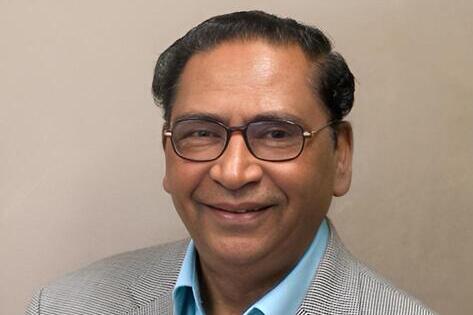Alum and renowned plant breeder Bir Bahadur (BB) Singh dies at 80

Dr. Bir Bahadur (BB) Singh, a distinguished alumnus of the College of Agricultural, Consumer and Environmental Sciences at the University of Illinois Urbana-Champaign, passed away on July 29, 2024, in his hometown in India. Singh was serving as a visiting professor in the Department of Soil and Crop Sciences at Texas A&M University. A visionary in global agriculture, Singh made monumental contributions to global food security through his groundbreaking work in legume breeding.
Singh was born May 1, 1944, and came from a very modest background in a small village in India where, until high school, he studied using kerosene lamps. He secured a merit scholarship and was admitted to G.B. Pant University. Singh was among the first students to graduate from G.B. Pant University, earning his bachelor's degree in 1960. He was identified as having outstanding potential and was provided a fellowship to Illinois, where he earned his master's degree (1965) and doctorate (1967) while working on soybean breeding on the Urbana-Champaign campus. In 1968, following a year of postdoctoral research at Cornell University, he returned to India and became a member of G.B Pant University faculty as an associate professor and soybean breeder. He taught introductory genetics and introductory plant breeding at the undergraduate level until he became a researcher at the International Institute of Tropical Agriculture (IITA) in Nigeria in 1978. Singh came to Texas A&M University in 2006 as a visiting professor to work on cowpea and cropping systems. He also taught "World Agriculture and International Plant Breeding" and was a driving force for students to understand the impact of plant breeding on 'feeding the world.' He published more than 225 research papers, guided 35 graduate students and developed numerous high-yielding stress-resistant legume varieties. He retired and returned to his home in India in 2023.
Singh was recognized for his work with legumes, including major advances in soybean for India and cowpea for Africa. He is credited with improving the diets, incomes, and lives of farming families across Africa and India. Most of Africa’s cowpea breeders were trained by Singh. The pigeon pea production in India has increased from 1.7 million tons in 1968 to more than 3.3 million tons and soybean production has increased from a mere 12,000 tons in 1968 to more than 11 million tons, making India the fifth largest soybean-producing country in the world, in large part due to the work done by Singh.
Singh participated in planning and supervised the construction of IITA Kano Station (Nigeria), which has evolved into a premier Regional Research Station for IITA. Singh also catalyzed the establishment of the Kano State/Leventis Foundation Farmers’ training school, Albasu, Kano State, for which he was honored with a Chieftancy Title. This school trains about 60 young farmers each year in improved agricultural practices.
In recognition of the impact of his work, Singh was awarded and recognized by many people and organizations. He has been recognized as a Fellow of the American Association for Advancement of Science (AAAS), the Indian Society of Genetics and Plant Breeding, the American Society of Agronomy, and the Crop Science Society of America. He was also recognized with the Senior Scientist Award by the Consultative Group on International Agricultural Research (CGIAR) and received the Silicon Valley Tech Museum award. The two-time World Food Prize Nominee was recognized by the College of ACES Outstanding Alumni Award and Illinois International's Madhuri and Jagdish N. Sheth International Alumni Award for Exceptional Achievement. In 2023, he also received the inaugural Dr. Tai R. Shin and Mrs. You H. Shin Humanitarian Award by the University of Illinois System in recognition of his exemplary impact on humanity by addressing global food security.
Singh is survived by his spouse and two sons, numerous extended family, and close friends. A philanthropist at heart, he played a huge role in assisting and developing schools in India and is recognized with a named building on the G.B Pant University campus. He also left legacies of endowed gifts at both Illinois and Texas A&M. Anyone wishing to contribute in his honor can do so online (in “Other Fund” include: BB Singh Awards for Outstanding Research #770843) and give.am/BBSinghAward.